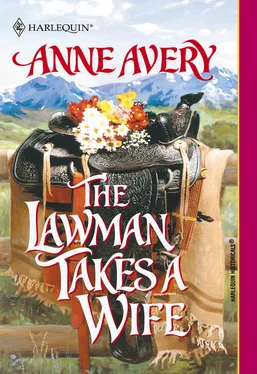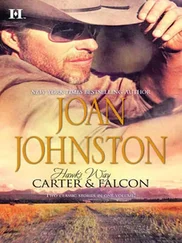Witt propped his shoulder against the building opposite Calhan’s, crossed his arms across his chest, and studied the scene before him. From where he stood, Main Street stretched north through town, headed straight toward the Elk Mountains that gave the town its name. The street’s unpaved expanse was lined on either side by false-fronted wood buildings and a dozen impressive brick ones. Saddle horses and teams hitched to a variety of buggies and wagons were tied at rails on either side of the thoroughfare. Several blocks up, a covered public well occupied the middle of an intersection, readily accessible to any citizen who lacked the convenience of a private one.
Nearer at hand, catercorner to Calhan’s General Store, stood a substantial brick building with an aura of sober respectability that immediately identified it as Elk City’s main financial institution. The sign over the door said Elk City State Bank in bold gold letters. It was more a concession to convention than an absolute necessity—the place was impossible to miss.
If there’d been any suspicious goings-on, a sharp-eyed, intelligent boy on the boardwalk in front of Calhan’s would have spotted them right off.
And if there weren’t any suspicious strangers, Calhan’s boardwalk was the ideal place for a boy with an overactive imagination and a taste for the lurid tales in dime novels to dream some up.
Elk City was a decent, workaday place that boasted good railroad connections, coal, lumber, water and some of the finest grazing range in the state of Colorado. It was also well off the more traveled roads and rail lines that laced the state. Payroll or no, the town wasn’t the sort of place he’d expect to find a bunch of desperadoes intent on a shoot-’em-up bank heist.
Witt watched as an old woman with a shopping basket over her arm made her way along the opposite side of Main. Every man she passed doffed his hat. Several exchanged a few pleasant words, as well. There was something comfortable about the scene, as if the folks he saw were glad to be right where they were. That wasn’t something you could say about every town he’d ever been through. Not by a long shot.
With hard work and a little luck, Elk City just might be the spot where he could finally put down roots, buy some land, some cattle. Maybe even get married. He was almighty tired of boarding house meals and narrow beds for one.
At the thought, the old, familiar hollowness came back. Witt shoved away from the building, disgusted with himself and his mush-headed daydreams. There wasn’t a woman in her right mind would want him, even if he’d had more than a dream to offer her, which he didn’t. Besides, if Clara hadn’t been able to abide him, it stood to rights nobody else would want to try.
He’d might as well not waste time reminding himself. The mistakes he’d made were well-plowed ground, yet for all the time he’d spent working that field, thinking it over, worrying about it, he’d never yet gotten a crop of anything but weeds out of it.
He’d do better to tend to his work, and right now that meant introducing himself to Mrs. Calhan and finding out if she’d noticed anything to indicate her son really had seen something, no matter how improbable the boy’s tale sounded.
As he crossed the street, Witt was conscious of a number of curious glances directed his way. Word had obviously gotten around that Elk City’s new sheriff was somewhat oversize. He ignored them. Over the years, he’d gotten used to the attention even if he’d never learned to like it.
He’d even gotten used to checking an unfamiliar boardwalk before he stepped on it to make sure it would hold his weight. Calhan’s boardwalk was sturdy enough and neatly swept, which was promising. The broad front windows were so clean they gleamed, which was even better.
Witt glanced at the display behind that glass and stopped dead in his tracks.
The proprietors of dry good stores generally had two ways of filling their front windows—either they stacked their excess supplies higglety pigglety on the broad display shelves built under the windows, heedless of appearance, or they crammed in as many unrelated items as they could until it was next to impossible to sort out anything from the heaps and piles and mounds of merchandise.
Mrs. Calhan had done neither. Instead, she’d constructed an intriguing arrangement of boxes of various sizes, then draped a length of shiny, bright-red cloth on top. The fabric spilled over the boxes and gathered in glistening folds in the spaces between them, for all the world as if it had been carelessly flung there, then forgotten. Yet there was something about the arrangement, something about the way the cloth caught the light, that drew the eye from one displayed item to another and then another, so that Witt felt as if he were being irresistibly drawn into the store.
Of course, it was possible the secret to the display’s attraction was that it offered nothing but candy—and Witt had a sweet tooth whose roots went all the way down to his toes.
He moved closer, studying the riches laid out before him. There were peppermint sticks in a tall glass jar, and chocolate creams in a box lined with shiny gold paper. There were licorice jawbreakers, and bright-yellow lemon drops, and candied nuts, and cream balls, and lady kisses, and an assortment of chocolate biscuits and bars arranged on a silver tray. There was a bowl of candied peanuts and another of mouthwatering pecan pralines. There was a little metal pirate’s chest stuffed with French bonbons that were as tempting to Witt as pieces of eight would be to a pirate. And there, right in the middle of it all, was an enormous glass jar tied with a bright-red ribbon and filled to overflowing with gumdrops in every color of the rainbow.
Witt let out the breath he’d been holding, and licked his lips. And then he pulled open the broad screen door and walked into paradise.
A shadow claimed half the light in the store.
Molly looked up from straightening the disaster the ladies had left in their wake and found a mountain standing in her doorway. The mountain held out a hand to make sure the screen door didn’t slam shut behind him, then took a cautious step forward, squinting against the change from the bright sunlight outside.
Slowly, she set down the drawer of buttons she’d been about to put away. Coreyanne Campbell had said the new sheriff was big, but Molly hadn’t pictured anyone quite this big. Who would have? The man stood six three in his oversized stocking feet, maybe more. He’d have to have his clothes special made for him—those broad shoulders wouldn’t fit into any ready-mades she knew of, and she’d done her best to scout out all the options for her customers.
And his face…
Molly’s fingers closed around the edges of the drawer.
If the man himself was a mountain, the core of him had been made out of granite. His face was all hewn slabs and hard lines, like the stark, gray rock that jutted out of the nearby Elk Mountains. Life had slashed grooves at the side of his mouth and the corners of his eyes, but it hadn’t softened one angle of the sharp-edged nose or that uncompromising jaw.
There was an awful lot of jaw.
Slowly, deliberately, Molly raised her gaze to meet his.
Gray eyes gleamed from beneath heavy lids. Even with the light behind him, shadowing his face, they seemed alive and bright and warm. Wary, almost. She had the odd sense that he took in more in one glance than most people saw in an hour of looking.
“Good afternoon, Sheriff,” she said, “What can I do for you?”
He snatched his hat off and, squinting, lowered his head to look for her in the shadows at the rear of the store. “Ma’am?”
When he came forward, his movements were quiet, controlled, but that didn’t stop the floor joists from creaking in protest at the weight. She could feel the jouncing with each step he took.
Читать дальше












